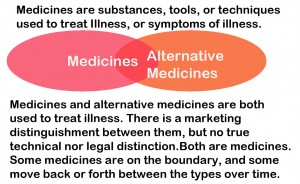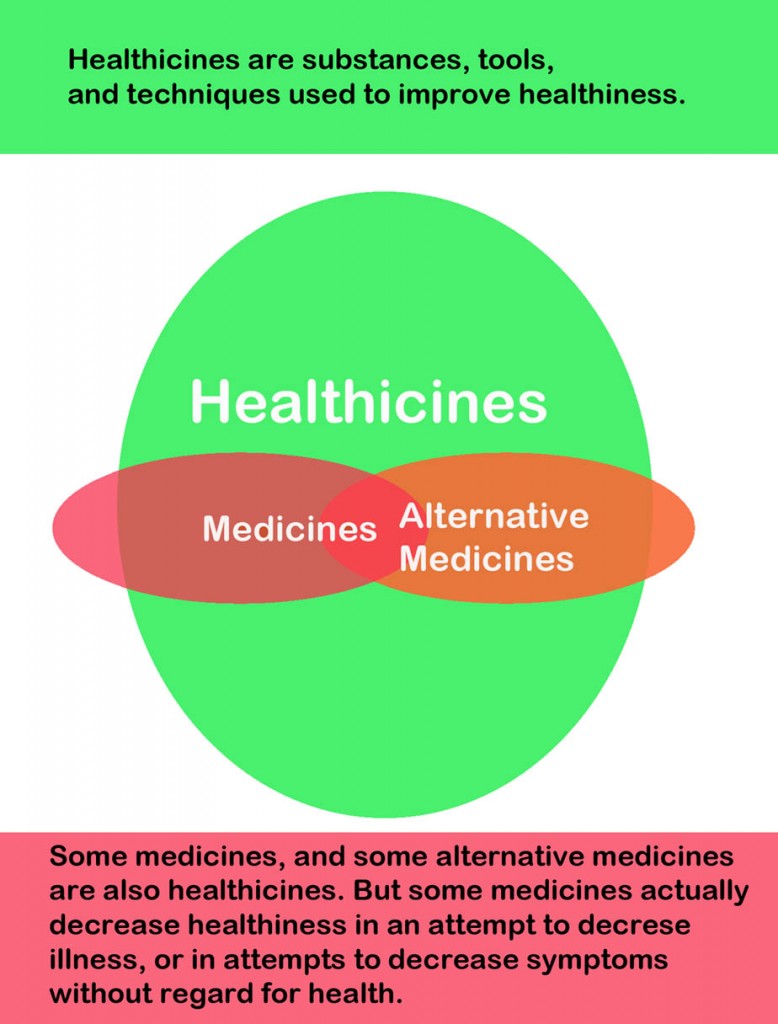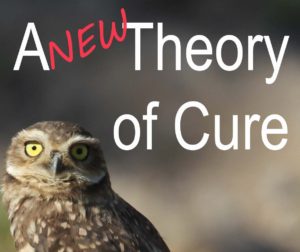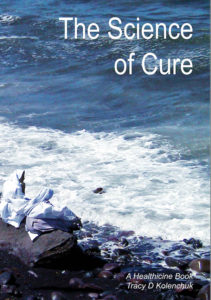Healthicine is not an ‘alternative medical practice’ – it is the practice of health, not of medicine. A healthicine is not an alternative medicine, it is something that improves healthiness. Health is larger than illness.
 Our current medical systems – both conventional medicine (which is known by many names) and ‘alternative medicines’ (of which there are many different types) share a common goal. The primary goals of medicine are to fight illness and symptoms of illness. Sometimes, medicines are used to ‘prevent illness’, but there is little emphasis on health.
Our current medical systems – both conventional medicine (which is known by many names) and ‘alternative medicines’ (of which there are many different types) share a common goal. The primary goals of medicine are to fight illness and symptoms of illness. Sometimes, medicines are used to ‘prevent illness’, but there is little emphasis on health.
The goal of healthicine is to improve healthiness.
There is confusion, in the field of medicine, with regards to health. Medicines fight illness, but generally ignore healthiness.
Some medicines work by attacking sources of illness (antibiotics). These are medicines in the most pure sense. They do nothing to improve healthiness, and can even harm your healthiness.
Some medicines work by attacking symptoms of illness – painkillers, cough medicines, and antihistamines are clear examples. These are ‘symptomicines’. Symptomicines do not address the cause of the illness, only the symptoms. The hope is that the body will deal with the illness that the physician cannot cure. Symptomicines, taken for chronic illness, can facilitate growth of the illness as symptoms are hidden.
Some medicines work by attacking specific signs of illness – statins and high blood pressure medicines are in this group. They do not address the underlying illness, nor any cause of the illness, but are specifically designed to address signs of illness. They are also symptomicines. These medicines often create physical imbalances in the body, that can lead to other symptoms, and often result in:
- a downward spiral of medicines to treat symptoms caused by medicines
- addictions to medicines that can not cure
- rebound effects that are stronger than the initial illness, if you quit the medicine
Healthicines can be used to fight illness. However, their main function is to create or improve healthiness. Vitamin C is a simple example. Vitamin C is essential to our health. Insufficient Vitamin C will lead, first to unhealthiness, and then later to illness. If your Vitamin C consumption level is ‘unhealthy’, you can consume Vitamin C, or foods containing Vitamin C, to improve your healthiness. If you suffer from an illness of Vitamin C deficiency, the correct treatment is consumption of Vitamin C.
If you are dehydrated, you need to drink water. If you drink water, your symptoms of dehydration will fade and disappear. Water and Vitamin C are not ‘medicines’. They are nutrients. They are healthicines, creating, supporting and improving healthiness. When you don’t consume sufficient amounts of specific nutrients – your healthiness drops. You become ‘unhealthy’. When you meet the ‘healthy need’, your healthiness rises.
When an unhealthiness is severe enough to warrant medical attention, it is often given a ‘disease name’. The symptoms resulting from a lack of Vitamin C are named ‘scurvy’. The symptoms resulting from a deficiency of water are named ‘dehydration’.
There are no names for lack of healthiness, and as a result: Medicine is blind to health. Until your Vitamin C deficiency is severe enough to result in a diagnosis, it is not acknowledged by medicine. Both conventional and alternative medicines are blind to health. Dehydration and scurvy are examples of ‘unhealthiness’ a deficiency of water, or a deficiency of Vitamin C. They are not treated with medicines, but with healthicines. A healthicine does not become a ‘medicine’ simply due to a ‘diagnosis’. Unhealthiness is not illness, and cannot be effectively treated with medicines.
At the simplest level, this does not lead to severe problems. It makes little difference if you call Vitamin C a nutrient when designing a healthy diet, and a medicine when treating scurvy. As long as it works, in both cases, there is little difference. In simple cases, where the unhealthiness is simple and well understood, medical techniques often find the right treatment, the right healthicine.
But in more complex cases of unhealthiness, medicine, including alternative medical practitioners fall back on symptomicines. Treating the symptoms is easier than searching for a complex cause. Treating symptoms is effective, the doctor and the patient can see results. Treating symptoms, without addressing cause, is commonplace in medicine.
The practice of healthicine is about health, the analysis and measurement of healthinesses, unhealthinesses, and causes of unhealthiness including causes of illness. Medicines can be healthicines, but only when they actually improve healthiness.
When we undertake the challenge of studying healthiness, we soon recognize that health is wider and deeper than medicine. Medicine is concerned with illness. Most of the time, we are not ill. We are always have aspects of healthiness, and of unhealthiness, that can be studied and improved. The Hierarchy of Healthicine shows us that healthicine covers the entire spectrum of health, from genetics, nutrients, cells, tissues, organs, bodily systems, body, minds, spirits, and communities. Our medical system does not recognize illness unless it resides in the body – illnesses of the minds, spirits and communities are outside of the scope of medicine. Healthicine is not limited to the studies of illness.
Healthicine is not medicine, nor alternative medicine. It is more, wider, and deeper than the simple science of fighting illness.
to your health, tracy
Tracy is the author of two books about healthicine:



